Motown is an American record label owned by the Universal Music Group. It was founded by Berry Gordy Jr. as Tamla Records on January 12, 1959, and incorporated as Motown Record Corporation on April 14, 1960. Its name, a portmanteau of motor and town, has become a nickname for Detroit, where the label was originally headquartered.
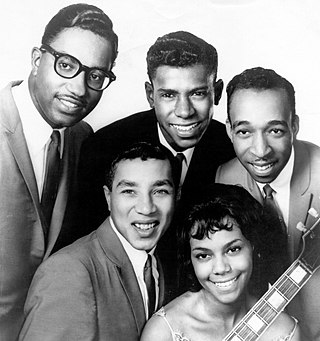
The Miracles were an American vocal group that was the first successful recording act for Berry Gordy's Motown Records, and one of the most important and most influential groups in the history of pop, soul, R&B and rock and roll music. The group's international fame in the 1960s, alongside other Motown acts, led to a greater acceptance of Rhythm & Blues and pop music in the U.S., with the group being considered influential and important in the development of modern popular music.
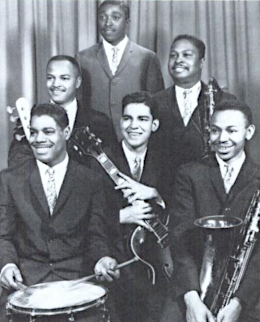
The Funk Brothers were a group of Detroit-based session musicians who performed the backing to most Motown recordings from 1959 until the company moved to Los Angeles in 1972.

"My Girl" is a soul music song recorded by the Temptations for the Gordy (Motown) record label. Written and produced by the Miracles members Smokey Robinson and Ronald White, it became the Temptations' first U.S. number 1 single, and is currently their signature song. Robinson's inspiration for writing "My Girl" was his wife, Miracles member Claudette Rogers Robinson. The song was included on the Temptations 1965 album The Temptations Sing Smokey. In 2017, the song was selected for preservation in the National Recording Registry by the Library of Congress as being "culturally, historically, or aesthetically significant".

Motown 25: Yesterday, Today, Forever is a 1983 television special, produced by Suzanne de Passe for Motown, to commemorate its 25th anniversary. The program was taped before a live audience at the Pasadena Civic Auditorium in Pasadena, California on March 25, 1983, and broadcast on NBC on May 16. Among its highlights were Michael Jackson's performance of "Billie Jean", Smokey Robinson's reunion with the Miracles, a Temptations / Four Tops "battle of the bands", Marvin Gaye's inspired speech about black music history and his memorable performance of "What's Going On", a Jackson 5 reunion, and an abbreviated reunion of Diana Ross & the Supremes, who performed their final #1 hit, "Someday We'll Be Together" from 1969. The show was written by Buz Kohan, Ruth Robinson, and de Passe. The broadcast was watched by over 47 million viewers.
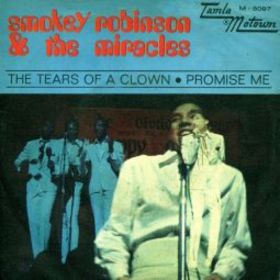
"The Tears of a Clown" is a song written by Hank Cosby, Smokey Robinson, and Stevie Wonder and originally recorded by Smokey Robinson & the Miracles for the Tamla Records label subsidiary of Motown, first appearing on the 1967 album Make It Happen. The track was re-released in the United Kingdom as a single in July 1970, and it became a number-one hit on the UK Singles Chart for the week ending September 12, 1970. Subsequently, Motown released a partially re-recorded and completely remixed version as a single in the United States as well, where it quickly became a number-one hit on both the Billboard Hot 100 and R&B Singles charts.
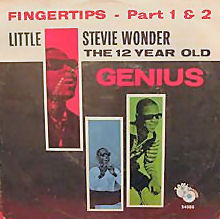
"Fingertips" is a 1963 hit single recorded live by "Little" Stevie Wonder for Motown's then Tamla label.
"For Once in My Life" is a song written by Ron Miller and Orlando Murden for Motown Records' Stein & Van Stock publishing company, and first recorded in 1965.
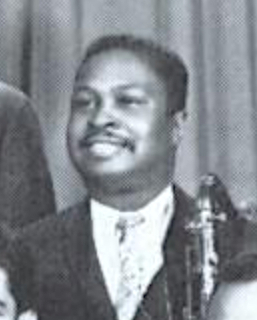
Henry R. Cosby was an American songwriter, arranger, record producer and musician who worked for Motown Records from its formative years. Along with Sylvia Moy, Cosby was a key collaborator with Stevie Wonder from 1963 to 1970. Cosby co-wrote and/or co-produced three No. 1 US hits: Stevie Wonder's "Fingertips" (1963), The Supremes' "Love Child" (1968), and The Miracles' "The Tears of a Clown" (1968).

The Miracles Recorded Live on Stage is a 1963 live album by the Miracles, part of the early 1960s Motown "Live on Stage" series by various artists. The first of three live albums the group released during their career, it features R&B numbers led by Smokey Robinson along with Bobby Rogers, Ronnie White and Claudette Robinson recorded at either the Apollo Theater in New York or The Regal Theatre in Chicago, Illinois during their 1962 and 1963 tour. Miracles member Pete Moore was serving in the US Army at the time of this performance. The opener "Mighty Good Lovin'" was selected for various later compilations, while "I've Been Good To You" later appeared in a stereo mix on the 2002 compilation Ooo Baby Baby: The Anthology.

Recorded Live On Stage is the name of a 1963 live album recorded by Motown star Mary Wells. The album was the only live album released by the soul singer during her short but successful tenure with Motown Records in the early sixties. The album starts off with an a cappella introduction of Wells by her backup vocalists, The Love-Tones, who are heard throughout the album. Her live version of her first release, "Bye, Bye, Baby" improved upon the studio version and became the way she would perform it from then on. The only other live performances Wells recorded on Motown can be found on the first two volumes of the Motortown Revue series. Marvin Gaye, the Marvelettes, (Little) Stevie Wonder and Smokey Robinson & The Miracles also recorded albums in the Recorded Live On Stage series.
"Mickey's Monkey" is a 1963 song recorded by the R&B group the Miracles on Motown Records' Tamla label. It was written and produced by Motown's main songwriting team of Brian Holland, Lamont Dozier, and Eddie Holland, who later went on to write two more Miracles hit singles, the Top 40 "I Gotta Dance to Keep From Crying", and the Top 20 "(Come 'Round Here) I'm The One You Need". This was an unusual writing situation for the Miracles, as most of their songs were generally composed by the group members themselves.
"What Love Has Joined Together" is a song written and composed by Miracles members Smokey Robinson and Bobby Rogers, and was recorded by six Motown acts: Mary Wells, The Temptations, Smokey Robinson & The Miracles, Barbara McNair, Syreeta, and Queen Latifah and was issued as B-sides to hits by Wells and The Temptations; "Your Old Standby" for Wells, released in 1963, and "It's Growing" by The Temptations, released in 1965.
"I Like It Like That" was a 1964 hit song by Motown group The Miracles on its Tamla label subsidiary. This is not the Chris Kenner hit song of the same name but a Miracles original, written by Miracles members Smokey Robinson and Marv Tarplin, and is included on the group's first greatest hits album, Greatest Hits from the Beginning. It was also the title song from their deleted 1964 album of the same name.

Flying High Together is an album by Smokey Robinson and the Miracles on Motown Records' Tamla label, released in 1972. It is noted as The Miracles' last studio album with original lead singer Smokey Robinson, who retired from the act to concentrate on his duties as vice president of Motown. The album charted at #46 on the Billboard Pop Album chart, and featured two singles: the appropriately named "We've Come Too Far to End It Now", which matched the parent album's chart position on the Billboard singles chart, charting at #46, and reached the Top 10 of the Billboard R&B singles chart, charting at #9, and "I Can't Stand to See You Cry", which charted at #45 Pop, and #21 R&B.
Motown Chartbusters is a series of compilation albums first released by EMI under licence on the Tamla Motown label in Britain. In total, 12 editions were released in the UK between 1967 and 1982. Volumes 1 and 2 were originally called British Motown Chartbusters; after this the title Motown Chartbusters was used.

The Complete Stevie Wonder is a digital compilation featuring the work of Stevie Wonder. Released a week before the physical release of A Time to Love, the set comprises almost all of Wonder's officially released material, including single mixes, extended versions, remixes, and Workout Stevie Workout, a 1963 album which was shelved and replaced by With a Song in My Heart. The set also contains a digital (PDF) booklet and three music videos: "Overjoyed", "Part-Time Lover" and "So What the Fuss".

A Motown Christmas is a Christmas music compilation album, originally released as a 2-LP set by Motown Records on September 25, 1973. It contains various seasonal singles and album tracks recorded by some of the label's artists from the 1960s and early 1970s. Some of the music had previously been released on the 1968 compilation Merry Christmas from Motown.

Harry Kim is an American musician born and raised in New York City. He is best known as a member of the Phenix Horns, the celebrated horn section of Earth, Wind and Fire, as well as for his long association with Phil Collins.

Antonio Lloyd "Tony" Newton is an electric bass player from Detroit, Michigan. Newton recorded and toured with The Jackson 5, Marvin Gaye, Aretha Franklin, The Temptations, Diana Ross, Tony Williams, John Lee Hooker, Smokey Robinson, Stevie Wonder, Michael Jackson, Joachim Kühn, Gary Moore, Allan Holdsworth and others.













